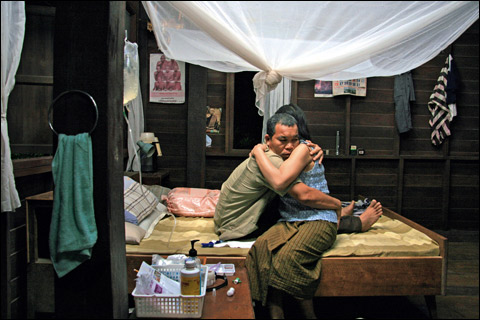
Uncle Boonmee Who Can Recall His Past Lives |
Apichatpong Weerasethakul must have done something right in one or more of his previous incarnations. Uncle Boonmee Who Can Recall His Past Lives, the writer-director’s oddball ode to the cheesy Thai movies of his youth by way of ancestral beliefs about the transmigration of souls, won the Golden Palm from the Tim Burton–led jury at the 63rd Cannes Film Festival, which closed on May 23.Uncle Boonmee believes his encroaching kidney failure is karmic retribution for having killed “too many commies,” as well as “lots of bugs.” The viewer is free to calculate how many domestic-terrorist insects he may have palled around with.
Returning for an ectoplasmic visit, one dead female character states that “Heaven is overrated — there’s nothing there.” Detractors — myself included — who fail to appreciate Uncle Boonmee’s ghosts, spirits, and the occasional libidinous fish or man-size creature in an ape suit may conclude that this year’s Palme d’Or–winning film is as overrated as a possibly hollow Heaven.
A big win in Cannes is, however, a welcome excuse beyond civil unrest to put Thailand in the news. “When I came to Cannes a few days ago, I almost couldn’t reach here because of the political situation,” Weerasethakul said at the post-awards press conference. “As I was leaving town, there was smoke everywhere.”
Weerasethakul made it, but invited juror and Iranian auteur Jafar Panahi did not. As they watched the 19 award-eligible films in a mostly underwhelming line-up (some of the best movies were not in competition), the jury members pointedly kept an empty seat marked with Panahi’s name. Imprisoned by the regime in Iran for unspecified transgressions, the award-winning filmmaker — who had embarked on a hunger strike — was released two days after the festival ended. Who says international pressure can’t make a difference?
The Grand Prize deservedly honored Of Gods and Men, the numinous, exquisitely told tale of a small community of French monks making honey and providing medical care to poor Muslims in a North African mountain village in the 1990s. Marauding fundamentalists test the monks’ consciences, as well as their common sense. Director Xavier Beauvois finds cinematic ways to convey moral courage, spiritual resolve, and the collective beauty of sincere faith. If there were a TV game show called Who Wants To Choke Up an Atheist?, these eight gentlemen would surely triumph.
Those on the lookout for fresh developments in world cinema, though, might have spotted the makings of a disturbing trend: giving major prizes to films that are still rough drafts for actual movies.
That Juliette Binoche won the Best Actress award for her careening mess of a performance in Abbas Kiarostami’s Certified Copy pegs Burton and his fellow jurors as certifiable. There are technical terms for movies and line-readings like this: “forced,” “contrived,” “stilted,” and “not good” come to mind.
Likewise, giving the Best Director award to Mathieu Amalric for On Tour, his sometimes amusing but wildly uneven preliminary sketch for a film about a Frenchman shlepping a troupe of American New Burlesque performers around France is like hearing that Sarah Palin has been short-listed for the Nobel Prize in Literature based on Going Rogue.